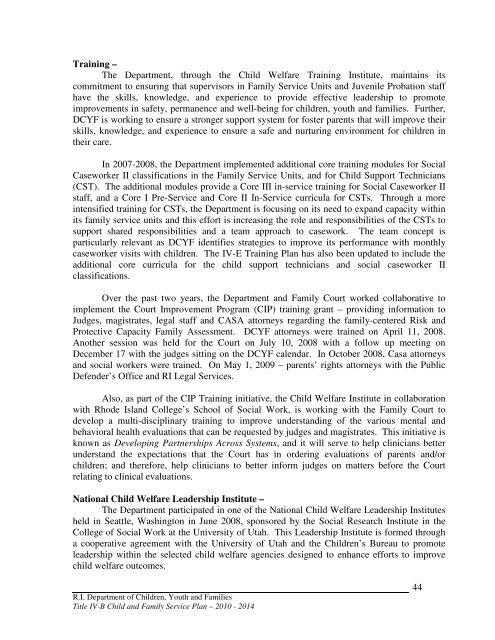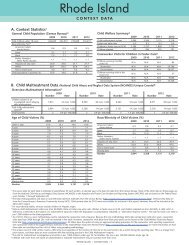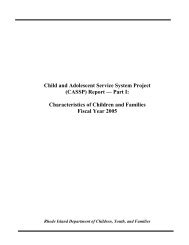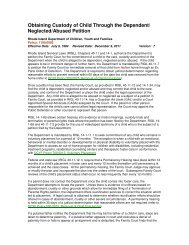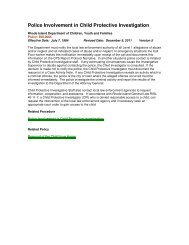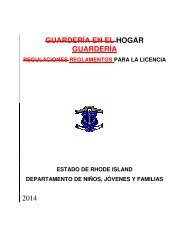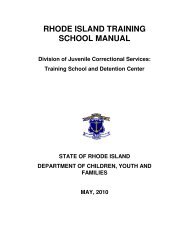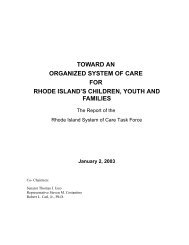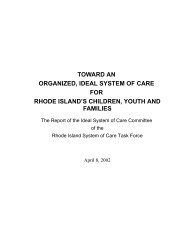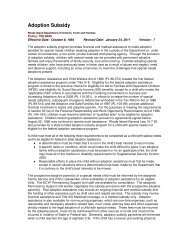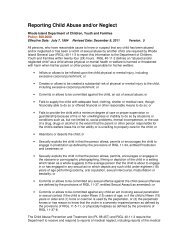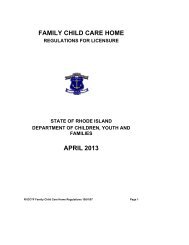CFSP 5 Year Plan - RI Department of Children, Youth & Families
CFSP 5 Year Plan - RI Department of Children, Youth & Families
CFSP 5 Year Plan - RI Department of Children, Youth & Families
Create successful ePaper yourself
Turn your PDF publications into a flip-book with our unique Google optimized e-Paper software.
Training –<br />
The <strong>Department</strong>, through the Child Welfare Training Institute, maintains its<br />
commitment to ensuring that supervisors in Family Service Units and Juvenile Probation staff<br />
have the skills, knowledge, and experience to provide effective leadership to promote<br />
improvements in safety, permanence and well-being for children, youth and families. Further,<br />
DCYF is working to ensure a stronger support system for foster parents that will improve their<br />
skills, knowledge, and experience to ensure a safe and nurturing environment for children in<br />
their care.<br />
In 2007-2008, the <strong>Department</strong> implemented additional core training modules for Social<br />
Caseworker II classifications in the Family Service Units, and for Child Support Technicians<br />
(CST). The additional modules provide a Core III in-service training for Social Caseworker II<br />
staff, and a Core I Pre-Service and Core II In-Service curricula for CSTs. Through a more<br />
intensified training for CSTs, the <strong>Department</strong> is focusing on its need to expand capacity within<br />
its family service units and this effort is increasing the role and responsibilities <strong>of</strong> the CSTs to<br />
support shared responsibilities and a team approach to casework. The team concept is<br />
particularly relevant as DCYF identifies strategies to improve its performance with monthly<br />
caseworker visits with children. The IV-E Training <strong>Plan</strong> has also been updated to include the<br />
additional core curricula for the child support technicians and social caseworker II<br />
classifications.<br />
Over the past two years, the <strong>Department</strong> and Family Court worked collaborative to<br />
implement the Court Improvement Program (CIP) training grant – providing information to<br />
Judges, magistrates, legal staff and CASA attorneys regarding the family-centered Risk and<br />
Protective Capacity Family Assessment. DCYF attorneys were trained on April 11, 2008.<br />
Another session was held for the Court on July 10, 2008 with a follow up meeting on<br />
December 17 with the judges sitting on the DCYF calendar. In October 2008, Casa attorneys<br />
and social workers were trained. On May 1, 2009 – parents’ rights attorneys with the Public<br />
Defender’s Office and <strong>RI</strong> Legal Services.<br />
Also, as part <strong>of</strong> the CIP Training initiative, the Child Welfare Institute in collaboration<br />
with Rhode Island College’s School <strong>of</strong> Social Work, is working with the Family Court to<br />
develop a multi-disciplinary training to improve understanding <strong>of</strong> the various mental and<br />
behavioral health evaluations that can be requested by judges and magistrates. This initiative is<br />
known as Developing Partnerships Across Systems, and it will serve to help clinicians better<br />
understand the expectations that the Court has in ordering evaluations <strong>of</strong> parents and/or<br />
children; and therefore, help clinicians to better inform judges on matters before the Court<br />
relating to clinical evaluations.<br />
National Child Welfare Leadership Institute –<br />
The <strong>Department</strong> participated in one <strong>of</strong> the National Child Welfare Leadership Institutes<br />
held in Seattle, Washington in June 2008, sponsored by the Social Research Institute in the<br />
College <strong>of</strong> Social Work at the University <strong>of</strong> Utah. This Leadership Institute is formed through<br />
a cooperative agreement with the University <strong>of</strong> Utah and the <strong>Children</strong>’s Bureau to promote<br />
leadership within the selected child welfare agencies designed to enhance efforts to improve<br />
child welfare outcomes.<br />
R.I. <strong>Department</strong> <strong>of</strong> <strong>Children</strong>, <strong>Youth</strong> and <strong>Families</strong><br />
Title IV-B Child and Family Service <strong>Plan</strong> – 2010 - 2014<br />
44


